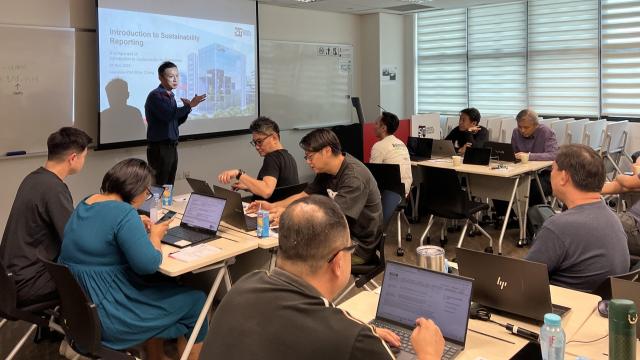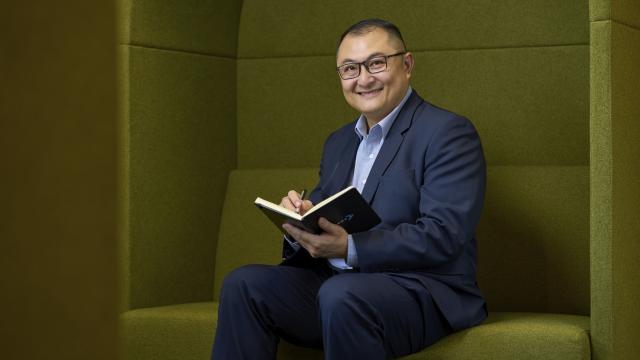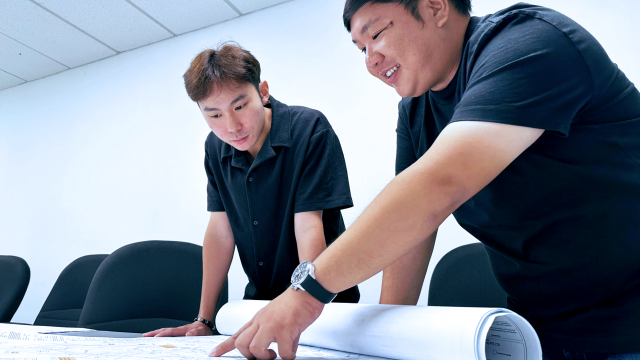Being a lover of classic cars, Tan Lu Han spotted an opportunity to convert classic cars into electric models using second-hand electric vehicle (EV) batteries that still function well. To do so, he would first need to assess the health of such EV batteries in a rapid and cost-effective manner. As such a device does not exist in the market, he decided to build one himself by first enrolling in SIT’s Doctor of Engineering programme.
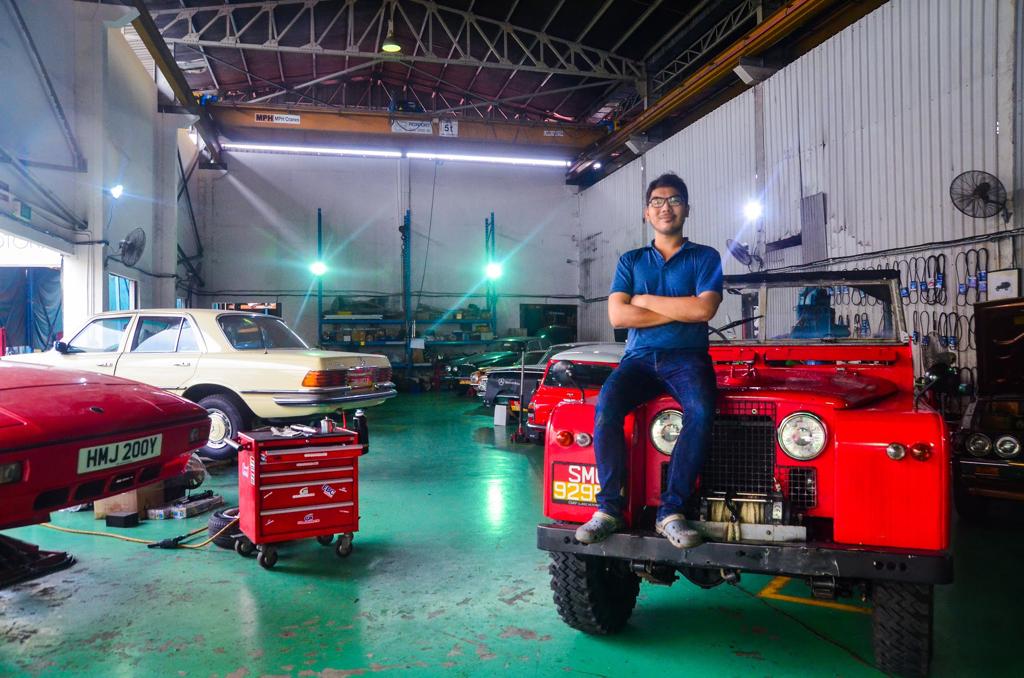
Tan Lu Han at the workshop of Classic Motorworks, a classic car dealership and service provider. (Photo: Tan Lu Han)
Classic cars may be decades old, but they continue to be the driving force behind Tan Lu Han’s innovative spirit. As the owner of Classic Motorworks, a classic car dealership and service provider set up in 2016, the 31-year-old spends countless hours servicing and maintaining the classic models that come through his workshop.
As more such cars are being converted into electric vehicles (EV) overseas, he thought “it would be a good business venture in Singapore as well.” That was when an idea struck him.
“Classic cars are typically driven for leisure, so they only require a fraction of the driving range of modern EVs. When a modern EV’s battery state of health drops below 80 per cent, it is deemed no longer fit for service and will be replaced. However, such a battery offers more than enough range to keep the classic car owner happy,” he explained.
To do that, he would need a low-cost device that could rapidly test the state of health of EV batteries. This is because EV batteries found in a vehicle workshop or scrapyard do not usually come with their usage history. As such, knowing the good batteries from the bad ones would be nearly impossible. While there are testing equipment that could determine the health of an EV battery, they are bulky and expensive. When he realised that a low-cost and rapid testing device was absent from the market, he decided to apply for the Singapore Institute of Technology’s (SIT) Doctor of Engineering programme in 2022 to develop it himself.
He chose to read a doctorate at SIT instead of other PhD programmes because of SIT’s strong focus on industrial application. As a testament to this, all doctoral candidates in SIT must be backed by an industry partner. This allows the candidate to receive guidance from both faculty and industry practitioners. This also ensures that the research has a strong potential for industrial applications.”
In a doctorate programme, candidates need to develop something that could be quickly put into use in the industry. This contrasts with a PhD programme, which focuses more on theory and not an immediate need for industrial application,” said Lu Han, who holds a Master’s degree in engineering.
A Need for Testing
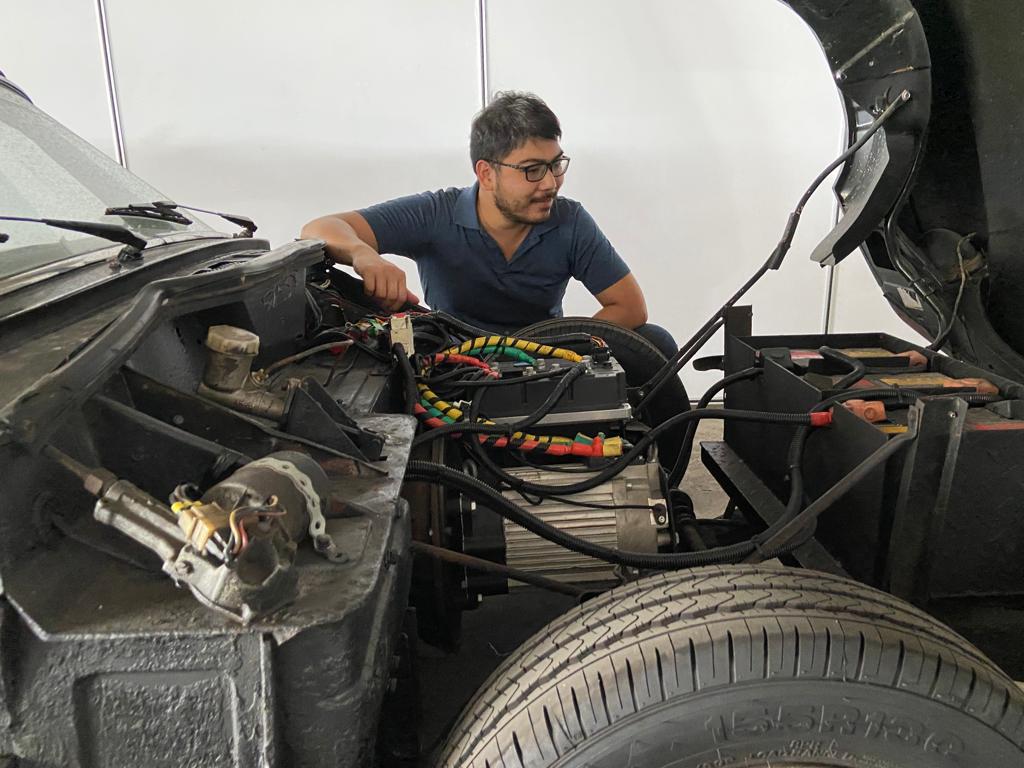
Lu Han with a prototype of an electric-converted classic car. (Photo: Tan Lu Han)
As the nation continues on its road to sustainability, the number of EV cars in Singapore will only grow. This means it will soon have to contend with the issue of battery disposal, as batteries in EVs have an average warranty of eight to 10 years.
Since there are no proper ways to diagnose their state of health, batteries are sometimes replaced even when they could still be in good health. Lu Han cited an example, “When my friend got into a small accident with his electric car (he drove up a kerb), the insurer was not sure whether the battery was in a good state. They thought it was better to just play safe and replace it.” While this may sound like a good idea, it actually adds to increased insurance costs for all parties. The insurer could have made a more informed decision if there had been suitable testing equipment.
Lu Han described the scrapping of still-healthy used batteries as wasteful because they could potentially be repurposed for less demanding use, such as battery energy storage systems (BESS), which help store renewable energy like solar energy in Singapore.
That was how mVizn, which Lu Han has worked with on several occasions, became the partnering company for his Doctor of Engineering project. The artificial intelligence and vision system company was already deploying software to charge EVs more efficiently and wanted to enter the BESS market. Purchasing new batteries for use in a BESS would offer no competitive edge. Hence, they are working with Lu Han to develop the battery testing technology to identify and purchase used but functional EV batteries for use in a BESS. This would lower their BESS cost as compared to their competitors.
Dr Sambit Bikas Pal, Director and Founder at mVizn, said, “Having worked with Lu Han on multiple AI projects in the past, we were extremely excited when he approached mVizn with ideas on developing novel testing methodologies for used EV batteries. As a tech-focused startup, mVizn is always keen on exploring innovative ideas and applying cutting-edge research to solve real-world problems. Globally, as the mobility and transportation industry rapidly moves towards electrification, mVizn firmly believes that battery recycling and upcycling technologies will play a crucial role in the near future. We foresee that Lu Han's research on developing reliable and cost-effective techniques and tools for determining the state of health of used batteries is an important step in this direction."
Strong Support Pillars
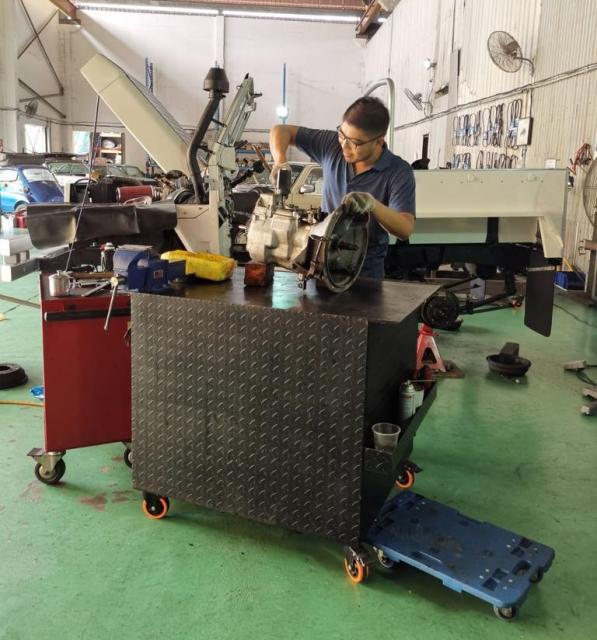
Lu Han repairing the gearbox of a car. (Photo: Tan Lu Han)
Since the EV industry is nascent with limited technical knowledge, Lu Han’s professors guided him on research methodology instead. Whenever he felt stuck or lost, they would point him in the right direction.
And lost was how he felt when he embarked on the programme in September 2022. “I did not know what I was doing,” he recalled. His academic supervisor, Associate Professor Sivaneasan Balakrishnan, suggested that he start by going through research papers online at the SIT Library. By doing that, he gained a better understanding of the concept of lithium battery testing. More papers were evaluated over the course of two semesters before Lu Han finally identified a suitable method that could be utilised for battery testing.
In terms of support from mVizn, this came in the form of industry knowledge. They advised him on practical issues and physical elements, like how best to tweak the experiment to ensure industry relevance. Lu Han’s industry supervisor at mVizn is Dr Sambit, who holds a PhD in Atomic Physics. “The support given by A/Prof Sivaneasan and Dr Sambit is certainly extremely valuable and something to be reckoned with,” he said.
Overcoming Roadblocks

Lu Han driving a classic Land Rover with his father. (Photo: Tan Lu Han)
Even with all the backing, the journey has not been plain sailing. Lu Han quickly realised that most research papers on the topic were too theoretical for practical applications. The majority were based on simulations and mathematical models, with less than five papers detailing a developed physical experiment to test the state of health of batteries.
Lu Han added, “Converting those mathematical models into equipment to use in the workshop is near impossible, primarily due to the chemical complexities of a lithium battery cell.”
A/Prof Sivaneasan said, “The rapid battery state of health evaluation method will offer a sustainable and cost-effective solution to repurpose used EV batteries for grid application easily. This reduces the need for new energy storage infrastructure and minimises environmental impact. Developing innovative solutions that are ready for the market requires extensive applied research beyond the boundaries of theoretical understanding. It also includes iterative design process to ensure product scalability, cost-effectiveness and performance.”
The worry of failing and not graduating gnawed at him. It was only after he received the first set of results proving he was on the right track that the stress dissipated slightly. The experiment, conducted in August 2023, showed promising results that the method developed could possibly determine the state of health of a lithium battery within a few seconds.
“It’s still difficult, but at least I can now see the light at the end of the tunnel. Previously, there was no light. It was just the tunnel,” he joked.
Lu Han, who aims to graduate in 2026, hopes to prove that his tests accurately represent the health of lithium batteries under 18 volts before upgrading the equipment to test batteries with a higher voltage. A modern EV’s battery voltage typically ranges from 240 to 400 volts. For this, Lu Han says that he still has a “long way to go”.“Overcoming the challenges so far has been fulfilling. If it were easy, calling me Dr Tan after I graduate would mean nothing,” he quipped. “It is only meaningful if difficult challenges have been overcome.”
SIT’s Industrial Postgraduate programmes are tailored for individuals and companies focused on developing talents to innovate and advance knowledge at the forefront of professional practice. Under the joint supervision of an academic and industry expert, students will get hands-on training in combining industry-focused research with management knowledge to solve critical business problems. Our programmes aim to enable students to customise knowledge acquisition to meet their personal developmental needs and their organisation’s business goals.
For more information, visit https://www.singaporetech.edu.sg/postgraduate/research or email ppr@singaporetech.edu.sg.


